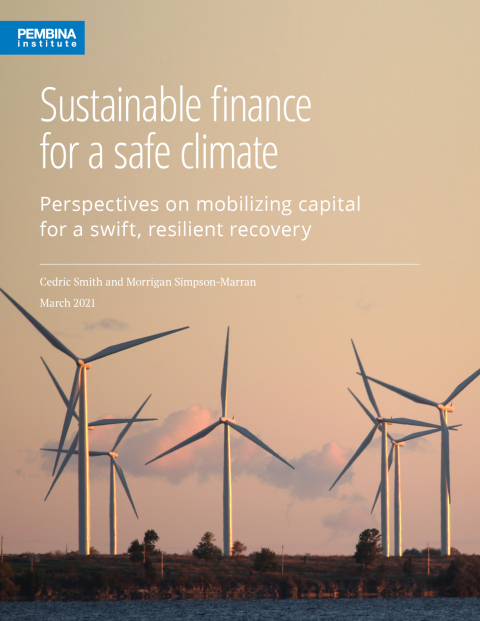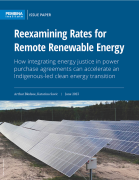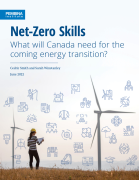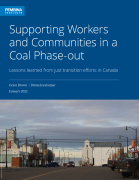As governments continue to address health and economic needs in the face of the COVID-19 pandemic, they must also chart a long-term financial plan for economic recovery. Canada, the U.S. and Europe are among jurisdictions choosing to design economic recovery plans that can deliver multiple benefits, including jobs, clean energy, and resilience in the face of future disruption. To maximize impact, Ottawa must be able to leverage the capacity of the private sector to invest in climate solutions.
To gauge investor opinion, in the midst of the pandemic the Pembina Institute partnered with GlobeScan to survey Canadians attitudes on sustainable finance, and then interviewed experts from the non-profit sector, industry, and financial institutions. We learned that Canadians want to align their investments with climate goals, and the majority (79%) want to see climate change addressed with the same urgency as COVID-19. We also learned they’re being stymied by a financial system that needs to evolve.
Based on opinion data, the interviews and our analysis, the Pembina Institute is making a series of recommendations toward a financing strategy that helps integrate the E, S (and G) in ESG (environmental, social and governance indicators) by enabling private capital to flow to the technologies and projects that can maximize job creation, emissions reductions, and return on investment between now and 2030.
Recommendations
To maintain a sense of urgency:
- Canada’s new Sustainable Finance Action Council should quickly undertake the work required to facilitate private-sector participation in a greener and more equitable recovery.
- The federal government should continue to ensure that climate-related measures remain integral to Canada’s long-term planning for economic recovery from the pandemic, and maintain its commitment to implement the recommendations from the Expert Panel on Sustainable Finance.
- In order to ensure its recommendations on a Canadian taxonomy for transition finance (as recommended by the 2019 Expert Panel on Sustainable Finance) is perceived as legitimate and contributing to a net-zero future, CSA Group should:
- Ensure Indigenous and resource-dependent communities, as well as environmental NGOs and other potentially impacted stakeholders and decision-makers, have an opportunity to provide feedback.
- Avoid overly restrictive criteria and ensure sufficient investments exist now and into the future to meet the criteria in the transition finance taxonomy.
- The federal government should also ensure CSA Group continues to have the resources necessary to continue its work in 2021, providing opportunities for thorough and fact-based discussions with diverse stakeholders.
- The federal government and provincial securities commissions should formally adopt disclosure requirements from the Task Force on Climate-related Financial Disclosures (TCFD) in time to support COVID-19 stimulus programs.
To leverage COVID-19 stimulus to advance sustainable finance:
- The federal government and provincial securities commissions should formally adopt TCFD disclosure requirements. The federal government should continue the requirement that borrowers of the Large Employer Emergency Financing Facility program produce an annual climate-related financial disclosure report in line with recommendations of the TCFD. Opportunities at the federal, provincial and territorial level for similar requirements in other COVID-19 relief programs, as well as any ongoing support programs for the Canadian private sector, should be explored.
- The federal and provincial governments should continue to emphasize clean investments and a green recovery in stimulus spending. Clean technologies should likewise be prioritized over legacy solutions in procurement strategies by all levels of government.
- Green stimulus investments should increase the degree to which private sector capital is leveraged — through organizations including the Canada Infrastructure Bank and the Canada Mortgage and Housing Corporation and through government taxation policy.
- Aid should not be given to traditional polluting sectors unless it comes with green conditions for sustainability improvements.
- Finally, where misinformation and misperceptions around the risk and return profile of sustainable investments exists, education should be provided — potentially through generating and disseminating objective research.






